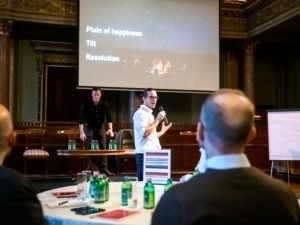Where can we help?
In more than 100 middle management training courses, we have collected typical problems and questions about leadership difficulties from the participants. Therefore, we understand exactly why freshly appointed middle managers feel the new situation as difficult, and what challenges they must face without effective leadership tools and methods.
During the development, we focus on two goals: we provide instant and practical solutions to the current challenges of the participants, and we also define their own leadership identity. We use feedback as a basic leadership tool in the programme, allowing participants to work on a variety of topics from their own experiences, including conflict management, motivating, managing difficult colleagues and different personalities, managing up, and expectation management. Due to the dynamic spread of digital operations, it essential to place special emphasis on the management of remote teams and organizational units.
How do we help?
MAIN TOPICS
FEEDBACK – “How can I give positive feedback? And the tough part: how do I give negative feedback?”
In the module, we review the content and communication aspects of the feedback in detail. We place a strong emphasis on negative feedback, and participants will also learn the fundamentals of positive leadership. We present the key steps of development-focused feedback using an easy-to-apply model. Receiving and utilizing feedback is essential for leadership development. Therefore, we address this topic also as a priority. We use role-plays to analyze feedback situations that pose a challenge to participants and evolve specific solutions together with the group.
SITUATIONAL LEADERSHIP - “Why is it that a particular leadership tool works for a subordinate and fails with another?”
As a leader, we need to be clear of the abilities and attitudes of our subordinates, as this enables us to handle different situations properly. Considering these attributes, participants learn about the characteristics of four typical situations. We will also analyse in detail what tools we can use to manage the people in these specific dimensions effectively. Our goal is to identify the specifics of managerial situations and the individual needs of subordinates, as well as present the applicable management solutions.
PERSONALITY TYPES “How can I learn how my subordinates think? How do I lead someone who thinks differently?”
As a leader, we often don’t understand the perspective of the person sitting in front of us: we feel that our colleague sees the world through completely different glasses.
In this program element, we broaden the leadership perspective, allowing for easier understanding and management of different views. We learn the typical personality dimensions, and then we use role-plays to evolve specific solutions for the most common conflict situations.
We place great emphasis on self-knowledge, supporting the development of an individual leadership style. The identification of the drives of their thinking and behaviour will help participants to recognize and interpret these patterns easily — and to use this method for others as well.
MOTIVATION - “What can I do with people who are not motivated? How can I stay motivated despite many tasks and responsibilities?”
Motivating people is one of the most challenging leadership tasks. Learning the motivations of others is a time-consuming process that requires focused attention on individual needs. In this module, we will learn about the main motivators that we can use as drivers for our subordinates. First, we map the participants’ motivational factors and practice managing them consciously. Based on challenging and specific individual situations, we then create a motivational handbook for participants, which they can use as a fundamental manual for motivating their colleagues.
ADDITIONAL MODULES
CASE STUDY
Leaders rarely have the opportunity to put themselves to the test and develop the specific skills required for teamwork.
In this module, participants use simulation projects to create a case study that addresses real, actual, and short-term business or organizational challenges. (The case study is formulated in collaboration with the company and alignment with a jointly developed concept.) Participants work on a real task, but they practice and develop their skills in a learning situation. They also learn how to control group dynamics processes. They receive feedback on their individual leadership strengths, as well as existing competencies that they can use in teamwork. They also identify the specific skills they need to improve. During the experience-based learning process, participants also learn the preconditions and milestones of effective group collaboration.
INDIVIDUAL COACHING
We have designed this individual coaching to support long development processes in a group. In this self-reflection-based module, participants explore the personal values and leadership tools that underpin effective individual leadership. We will answer specific questions that arise during the training. Moreover, we identify the skills that need to be developed for an authentic and strong leadership role. At the heart of our solution-based methodology is positive behaviour development, which increases individual responsibility and drives actions, allowing for a quick capitalization in everyday leadership activities.
FIREPLACE DISCUSSION
Leadership role models are crucial in the process of becoming a leader. To the Fireplace Talks, we invite experienced senior managers who will share their best leadership practices with participants. Before the moderated discussion, participants jointly compile the agenda in a facilitated preparatory event, ensuring that the discussion will cover important and relevant during topics. Also, we will help participants formulate their specific questions.







